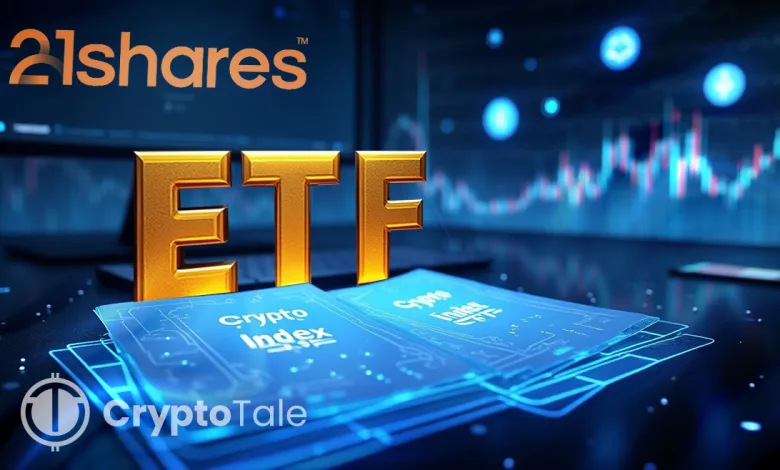21Shares Files Two FTSE Crypto ETFs, One Without BTC

- 21Shares filed two FTSE crypto ETFs with one giving exposure without Bitcoin involvement.
- The ETFs use a 40 Act structure and aim to offer easier tax reporting for investors.
- These filings come as ETF issuers push ahead without waiting for SEC crypto rules.
On July 18, digital asset issuer 21Shares officially filed registration statements with the U.S. Securities and Exchange Commission (SEC) for two crypto index ETFs. These include the 21Shares FTSE Crypto 10 Index ETF and the 21Shares FTSE Crypto 10 ex-BTC Index ETF, both structured under the Investment Company Act of 1940. The filings were made in partnership with ETF Solutions by Teucrium, a firm known for advising and managing white-label ETFs.
The move places 21Shares ahead of SEC’s broader crypto ETF rulemaking. Both ETFs intend to track indexes developed by FTSE Russell, which is recognized globally for its rigorous index methodology and market governance. These filings aim to address rising demand for regulated digital asset investment products that are accessible, diversified, and tax-efficient.
Structure and Purpose of the Proposed Funds
The 21Shares FTSE Crypto 10 Index ETF has as its aim a cap-weighted index of the ten leading digital assets using market capitalization. It varies dynamically in its methodology and puts more weight on the bigger and more established cryptocurrencies, which have more significance in the market. The best part about this structure is that the investors get exposure to the main movers and shakers of the digital space.
The second fund, the 21Shares FTSE Crypto 10 ex-BTC Index ETF’s function is to track the same index universe but excludes Bitcoin. This version seeks to offer exposure to emerging digital assets and blockchain technologies that prioritize utility-based use cases rather than Bitcoin’s store-of-value narrative.
Both ETFs rely on FTSE Russell’s research and screening process, paired with 21Shares’ internal analysis, to determine index inclusion. According to Kristen Mierzwa, Head of Digital Assets at FTSE Russell, “Collaborating with 21Shares on a market exposure pair—with and without Bitcoin—demonstrates our dedication to digital asset innovation.”
Regulatory Foundation and Strategic Timing
By filing as ‘40 Act funds, both ETFs qualify for streamlined tax reporting through Form 1099, avoiding the more complex K-1 forms often tied to other fund structures. This makes the products appealing to a broader investor base, particularly within the U.S. market.
These filings go one way with a tactical push by issuers to establish market-ready crypto funds ahead of final SEC guidelines on digital asset ETFs. Notably, they follow similar structures adopted by recent launches, which include the Rex-Osprey Solana staking ETF. Federico Brokate, Head of U.S. Business at 21Shares, stated,
“Investors are increasingly seeking diversified access to digital assets, and we are offering ETF structures to meet this demand.”
This trend points to a broader industry move toward preemptive compliance and market readiness. Firms like 21Shares are building products that match existing regulatory standards, rather than waiting for comprehensive rulemaking from the SEC.
Key Industry Implications and Market Direction
These proposed ETFs expand investor options and provide new tools for institutional and retail players seeking digital asset exposure. The ex-BTC variation particularly caters to those wanting to avoid Bitcoin dominance while still engaging with the broader crypto ecosystem.
Related: Nasdaq Files 21Shares SUI ETF With SEC for Quick Review
The collaboration with Teucrium provides the product structure with stability in operations and experience. The company will offer advisory and white-label services with no-nonsense assistance in regulators, efficient fund deployment.
Although the registration is still under review by the SEC, the filings indicate increasing pressure toward diversified crypto investment products in the United States. As demand for digital asset exposure has gone up, the ETF market is starting to move out of single-token products and into more broader, index-based solutions.




